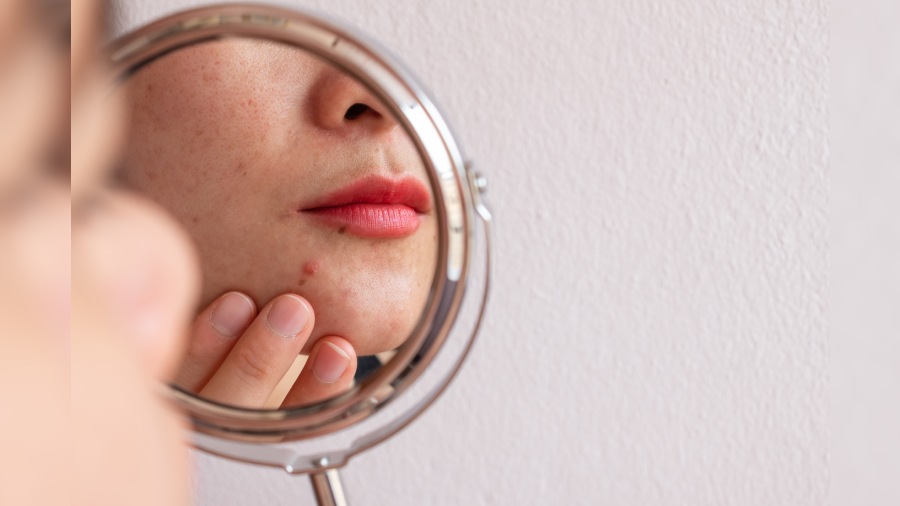Acne or pimples affects 85 per cent of people at some time in their lives. Acne can occur in anyone at any age. It is more likely if there is a family history. It can be precipitated by hormonal imbalances that are likely to occur during puberty, pregnancy and with obesity.
Basic acne lesions are called comedones. They are due to a pore in the skin that has become clogged with sebum (natural oil of the skin). If the pore remains open, it appears black in colour and is called a blackhead. If the opening of the pore closes off, then it looks pearly white and is called a white head. Acne is most likely over the face, neck, shoulders and back. It can occur over areas of constant friction like that of a tight cap.
These comedones can get secondarily infected with bacteria, especially if they are plucked or picked. They can then form papules, pustules, nodules and cysts. Men who have taken performance-enhancing drugs (steroids or testosterone supplements) can get a severe form of acne called acne conglobate. Multiple inflamed nodules connect under the skin. They leave scars when they heal.
Some unexpected foods act as acne triggers. Milk can aggravate acne. This is probably due to the hormones naturally present in milk. Chocolate does not aggravate acne but if your diet contains a lot of carbohydrates like cake, rice and bread and aerated soda drinks, the blood sugars are likely to spike. This may aggravate acne. Greasy food itself does not aggravate acne but if you spend time deep frying foods, the oil can clog your pores and aggravate acne even at an older age. Using oily makeup and not washing it off can also clog the pores.
Fish contains omega-3 fatty acids. This lowers inflammation and improves acne. You can take omega-3 fatty acid supplements if you are a vegetarian. People with acne often have low levels of micronutrients such as Vitamin E and selenium, which are present in nuts. Taking 20-24 almonds or peanuts a day will help. These nutrients also protect cells from damage and infections. In addition, nuts contain zinc, which has a preventive and protective action against skin disorders. The adult requirement for zinc is 40mg a day.
Acne is not caused by dirt and neither are blackheads. So, scrubbing your face with harsh soaps is unlikely to help. It will only damage the skin further and cause scarring. Use a mild, non-irritating soap or face wash. Baby soaps are a good alternative. Do not apply soap directly to the skin. Apply it to a loofah or wet towel, and then gently wash the face. Try to keep the pores open with steam inhalations twice a day.
Mild acne means that you have less than 30 lesions at any given time. Self-treatment with gels and ointments is often sufficient. They can be purchased without a prescription. They contain benzoyl peroxide, resorcinol, salicylic acid or sulfur. Do not apply steroid creams. Treatment needs to be continued for around one and a half months to see improvement. If the lesions remain the same or become worse after this time, or if there are more than 30 lesions, systemic treatment with medication may be required. Anti-antibiotics or oral contraceptives may be needed. Some of these creams can cause photosensitivity, with darkening or lightening of the skin. Treatment should always be under the supervision of a dermatologist.
The writer has a family practice at Vellore and is the author of Staying Healthy in Modern India. If you have any questions on health issues please write to yourhealthgm@yahoo.co.in










